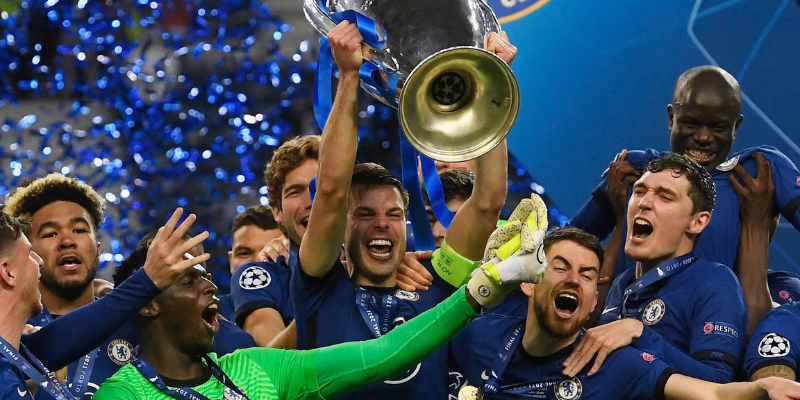In the grand tapestry of European football, Chelsea vs Marseille history Champions League is not a rivalry rich in volume—but every matchup carries weight. These two sides,, have only crossed paths a handful of times in Europe’s grandest club competition. Yet each meeting has had moments of drama, resilience, and tactical intrigue. In this article, SaiKick will guide you through every chapter of their Champions League encounters: the results, key matches, historical context, player stories, statistics, and what the future might hold.
Origins and first encounters

The paths of Chelsea and Olympique de Marseille first crossed in the 1999–2000 Champions League group stage. Marseille, one of France’s European standard-bearers, was navigating a period of return to continental prominence. Chelsea, meanwhile, was cementing its status in Europe following the Roman Abramovich era.
- 15 September 1999: Marseille vs Chelsea, group stage — Marseille secured a 1-0 home win.
- 8 March 2000: Chelsea vs Marseille — Chelsea took a 1-0 win at home to level the head-to‐head.
These early encounters set a tone of tight margins and tactical caution, rather than goal feasts.
Over time, Chelsea’s European ambitions grew, with more frequent appearances, whereas Marseille’s continental fortunes ebbed and flowed. But when they met again in the Champions League, the stakes remained high.
Head-to-head record and statistics

When assessing Chelsea vs Marseille history Champions League, the head-to-head ledger is modest:
- Matches played: 4
- Chelsea wins: 2
- Marseille wins: 2
- Draws: 0
In terms of goals, both sides have managed just a few across these matches—underscoring the tightness of their clashes and defensive emphasis. Official UEFA records confirm this balanced win split in Champions League competition.
One particularly notable tie was in the 2010–11 season, when they met twice in the group stage:
- 28 September 2010: Chelsea 2–0 Marseille
- 8 December 2010: Marseille 1–0 Chelsea (late strike secured the win for the French side)
Thus that campaign ended evenly matched: one home victory each, no draws.
It’s also worth noting the contrast between their European pedigree: Chelsea has multiple Champions League titles, deep runs, and consistency. Marseille, meanwhile, holds that remarkable 1993 European Cup (Champions League predecessor) win—still the only French club to achieve it to date.
Key matches in the rivalry

While there are only a few battles to pick from, some matches stand out for drama, stakes, or narrative.
2010 / 11 group stage clashes
As mentioned, the two group-stage encounters exemplify the back-and-forth nature of Chelsea vs Marseille history Champions League.
In London, Chelsea controlled the game, attacking effectively and sealing victory via Terry’s header and Anelka’s penalty. The away leg in Marseille was tighter, with the hosts eking out a win to salvage pride and parity in the overall head-to-head. com])
1999–2000 group matches
While data is less detailed for those matches, the initial meeting in Marseille saw a narrow home win. The return fixture mirrored that exact margin, with Chelsea clawing a victory and keeping their European campaign alive.
These early ties were never goal fests. Instead, they were boils of tactical chess: tight defenses, single strikes, and strategic substitutions.
Tactical styles and changing eras
Every clash between these two has been shaped by the era in which it occurred—the managers’ philosophy, squad makeup, and continental context.
- Late 1990s / early 2000s era: European football still tilted toward defenses and compact systems. Marseille, with solid French domestic grounding, relied on compact blocks and opportunistic counters. Chelsea, with growing budgets and emerging continental ambitions, sought to mix physicality with width and strategic pressing.
- 2010 era: Chelsea under managers like Carlo Ancelotti or André Villas-Boas (transitional era) deployed stronger squad depth, pressing, and control. Marseille, under Didier Deschamps and later others, emphasized grit, pace on flanks, and exploiting opposition errors.
Across all meetings, a recurring theme emerges: both teams prioritize structure and don’t often leave themselves exposed. That’s one reason why no match ended in a draw—one team always edged ahead.
Players who left a mark
Because there are few meetings, no player dominates the head-to-head narrative entirely. But several figures left memorable impressions.
- John Terry: His goal in 2010 was a pivotal turning point. A leader at the back, his aerial threat in set-pieces frequently added dimension to Chelsea’s European outings.
- Nicolas Anelka: Scored a penalty in the 2010 home leg, showing his knack for delivering when it mattered in continental competition.
- Didier Drogba: Although he didn’t feature in many direct Marseille versus Chelsea fixtures, Drogba remains linked in the broader Chelsea lore and Champions League narrative.
- Marseille’s squad depth and defensive resilience in those ties often comprised unsung heroes: defenders and midfielders who prevented Chelsea’s more heralded attackers, the absence of star duels or headline-grabbing player rivalries in these clashes adds to their mystique—they were battles of systems, not individuals.
Broader context: European identity and ambition
To understand Chelsea vs Marseille history Champions League, we also must view how each club positions itself in Europe at large.
Chelsea, since the Abramovich era and sustained investment, has had the expectation of deep Champions League runs. Multiple quarter-finals, semi-finals, two titles (2012, 2021) speak to that identity.
Marseille’s path has been more varied. Their 1993 European Cup triumph remains a crown jewel of French football history. But since then, their performances have fluctuated. In European competition, they’re often underdogs against powerhouses.
Thus, when Marseille faces Chelsea in the Champions League, there’s always a narrative of David vs Goliath—even if the balance of wins is even.
What to expect in future matchups
Given how Chelsea vs Marseille history Champions League has played out so far, what might future ties bring?
- Expect close margins. Neither side tends to overcommit offensively when the opponent is strong.
- Deep tactical preparation. Managers will likely deploy dual pivot midfielders, exploit flanks, and watch transitions carefully.
- Low-scoring affairs. Given how past meetings have ended, a 1–0 or 2–1 outcome seems likelier than wild scorelines.
- Substitutions and bench strength could decide matches. In tight ties, impact subs—especially defensive reinforcements or dynamic wingers—could tilt balance.
- Psychological edge: Chelsea’s Champions League pedigree may serve as subtle intimidation, but Marseille’s hunger and unpredictability make them dangerous.
A future tie could also come outside group stages, especially if Marseille returns more consistently to the Champions League knockout phases.
Top 3 memorable facts in the rivalry
Here’s a distilled list of standout elements in Chelsea vs Marseille history Champions League:
- Balanced record: 2 wins each over 4 matches—no draws have ever occurred.
- 2010 campaign equality: Each side won at home in the 2010–11 group stage, reinforcing the home advantage and tactical caution.
- Margin of victory: Every match was decided by one or two goals—never blowouts—emphasizing how closely matched these sides have been in Europe.
Conclusion
Chelsea vs Marseille history Champions League might not be a marquee European rivalry in volume, but every time these giants collide, drama and tension follow. As we have seen, matches are typically tight, low scoring, and determined by small margins and clever coaching. The rivalry carries special weight because of the identity clash: Chelsea’s continental ambitions versus Marseille’s legacy as French football’s torchbearer.
If you’re hungry for deeper analyses—lineups, xG metrics, player matchups—or want to follow upcoming Champions League fixtures, SaiKick is your home. Bookmark us, return often, and let us journey with you through the beautiful complexities of European football.






